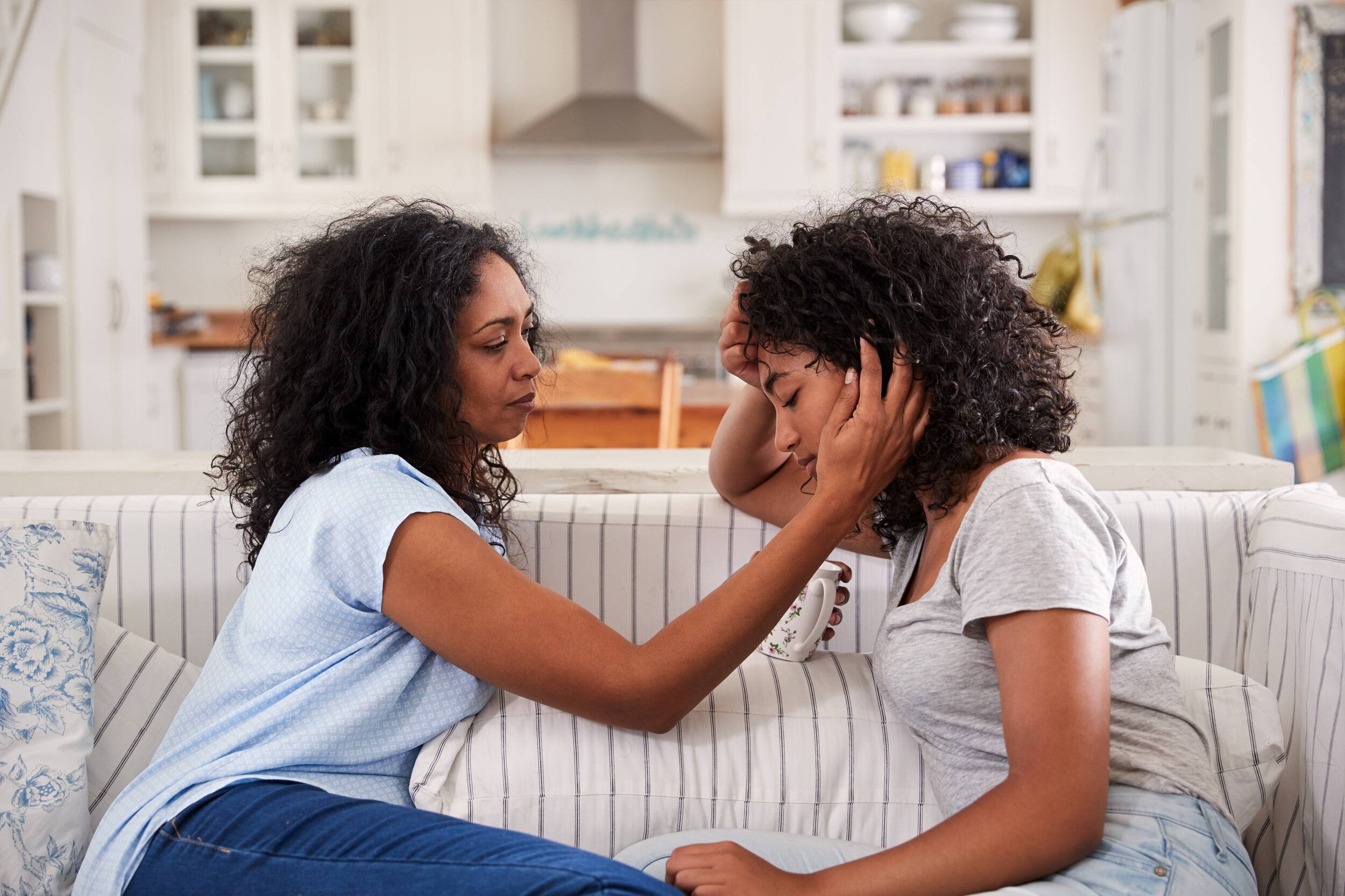
Helping teenagers cope with grief
Posted by AK Lander | On May 17, 2021 00:00
Grief is difficult, no matter a person’s age. However, teenagers especially can find it hard to cope. Find out some ways you can help your teenager.
Losing someone you love and care about is hard at any stage of life, however, for teenagers who might already be in the process of learning to deal with new emotions and feelings it can be incredibly difficult and isolating. As we progress through life, we become more accustomed to grief and are more expectant of death, but, when younger grief can be something we don’t expect and don’t know how to process.
Unlike children, teenagers are more likely to understand death to a deeper level and will have a greater grasp of what losing someone really means. However, they don’t have the experience that adults have with loss and death and can be in a place where they aren’t fully in control of their emotions due to puberty and lifestyle changes.
Whether it’s the passing of a grandparent that has hit them hard or a more unexpected death of a friend or loved one that’s affected them, it can be difficult to know how to properly support your teenager through grief whilst giving them the space and independence they often crave. If you are looking for ways to help, in this article, we explore some of the best ways you can be there for a teenager struggling with grief.
READ MORE: Understanding grief behaviours and the symptoms of grief
Try to prevent other stresses
One of the biggest things you can do to help a teenager going through grief is to try and prevent other stresses in their lives. From school or college to their personal lives, trying to reduce friction as much as possible is a great way to help them heal and it is something that can be done without them needing to help.
A great way to do this can be to contact their school or college on their behalf and ensure their teachers know they are currently grieving; you may even discuss them having some time off to help cope with their feelings. You could also try to help when it comes to their personal life, whether being lenient on chores or house rules, letting them have some friends over to destress or just giving them a ride when they may have had to walk in the rain. These might be small things, but they make sure there are fewer moments in their day when they have to deal with both stress and grief, a tricky combination.
READ MORE: How mindfulness can help with grief

Talk on their timeline
Talking about grief with friends and loved ones is one of the best ways to process it. However, having those conversations, especially for the first time, can be hard. It’s important that, during this time, you are allowing your teenager to talk on their own timeline and not forcing them to have conversations they aren’t yet ready for.
Of course, there will be some things you need to discuss, perhaps arranging the funeral or getting opinions when you go to buy a memorial headstone, but any deeper conversations should be on their terms. Let them know that, when and if they are ready to talk, you’ll be there to help with any questions they have or just to let them vent.
Becky from The Lifestyle Blogger UK shares her advice: “A teenager is full of new hormones and new feelings they are trying to deal with anyway so adding grief with this can be very hard for a teenager to deal with. After going through a death in my family as a 13-year-old, my advice would be for the parents to let them know they are there if they want to talk but also not to push the subject.
“Give them space but also keep an eye on them. When I was given the space to think things through, it really helped me and knowing that my parents weren't pushing me to talk was a huge help. I liked knowing that they would be there when I was ready to talk to them, but it felt nice knowing they trusted me to do things in my own time/way.”
Marie from Tummy 2 Mummy, an honest parenting blog, agrees. After losing her Dad when Marie was only fourteen, she has plenty of advice for parents looking to help their teens through grief: “I think just be patient. Understand that they may not want hugs from you or to sit and talk about feelings. Just let them know you are there and give them space. Ask what you can do to help, but never force your own opinions on them.”
If you feel as though you want to offer access to a professional so they can talk more openly when they are ready, you could also look at online grief counselling.
Offer distractions
When we are dealing with something, whether it’s grief, stress, sadness or something else, having a distraction can be incredibly welcome. This could be taking a walk amongst nature, indulging in our favourite meal or taking a short trip. Whilst you should never force the teenager in your life to do any of these things whilst they are dealing with grief, trying to offer these distractions up can be incredibly beneficial.
A nice way to do this, is to make it sound as though it’s for you, for example, you could say something like ‘Hey, do you fancy getting a takeaway tonight, I feel like I could really use a pizza?’. Or maybe ‘I’m planning to head out on a walk, do you mind keeping me company?’ They may still say no, however, by phrasing the offer this way you don’t risk them worrying you are pitying them and instead they can feel as though they’re helping you out.
Georgia from Brit Voyage spoke to us about her experience with loss as a teen: “I was eighteen when a friend from school committed suicide and I did not experience the same intensity of grief again until I was 24 and lost my grandfather. Although the loss of my grandfather was much more painful, the passing of my friend was a complete shock. The major thing that enabled me to move forward from these traumatic situations was that my grief was a shared experience - with my friends from school, and with my family. Had I felt alone at these points in my life, I'm not sure I would have been okay.
“It's no secret that teenagers are explosive and emotional beings, who sometimes struggle to process their feelings. Patience is key, as teens may be prone to outbursts, or shut down entirely. Allow them to 'do what they want' in the initial aftermath of the grief - if they want a day off, or two cheeseburgers instead of one, or a new pair of trainers, let them have it (within reason) as it might give them that tiny burst of happiness they need to get through the day. Then, patience, love, affection works wonders.”

Learn with them
It’s only natural that, as you progress through life you learn lessons, and unfortunately, this can mean learning how to better deal with grief. As a parent or guardian, you’ll likely have the wisdom to share with your teenager about the emotions they are feeling and what to do, however, this is a time to try and push that to one side and instead learn with them.
We all remember being a teenager and being told what to do and how to feel can be an incredibly hard pill to swallow, so, when dealing with grief having someone talk to you about how to cope (for example, telling them if they just do X they’ll feel better) or trying to compare their grief to yours (for example, saying something like ‘well, when I lost my grandparent I was fine very quickly’) can do the opposite of helping.
Cass from The Diary of a Frugal Family, a family lifestyle blog, explains: “Try to avoid saying clichés like 'it'll be ok,' or 'time heals' because to a teenager, they just sound like you're saying what you think they want to hear.”
Instead, at this time, when they have a question try and learn with them and not lecture them. This can mean looking at online resources together to find solutions or not comparing their grief to your own experience. As we know, all grief is different and what may have been simple for you may be incredibly hard for them.
These articles contain some wonderful resources you could try:
- Grief books to help you cope with loss
- The best online grief resources
- 5 Apps that help with grief
- 6 grief podcasts to help you cope with loss
Allow them to be sad
Grieving can take a lot of time for some people. During this time, it’s important that you allow your teenager to be sad. Don’t force them to put on a brave face and instead, let them know that it’s okay for them to feel this way and they shouldn’t feel a rush to ‘get back to normal’.
Oftentimes, when we lose someone we care about, that sadness never really goes away, we simply learn to live with it. And for teenagers, who may well be experiencing their first loss or a traumatic loss, this moment will be with them for the rest of their lives. Make sure that they don’t look back and feel as though they didn’t have enough time to process their emotions.
Helen from Actually Mummy, a blog for parenting teens, tells us: “The one thing I'd say is essential, is never to try to cheer them up. By all means, distract them with enjoyable activities, but don't tell them to try and be cheerful. They need time to process what has happened and to fit it into their new version of life. Empathy is always the best way to make a child feel accepted and understood, and in time, to come to terms with their own feelings. Statements like ‘That must feel very painful,’ always land better with a teenager than questions like ‘How are you feeling?’ Above all, let them know that you're always available to talk when they want to, and demonstrate that by paying them full attention when they do decide to express what's on their mind.”
However, if this sadness persists it can be wise to look at bringing in some extra help. Keep an eye out for any dangerous or concerning behaviour that doesn’t change, including:
- Symptoms of PTSD and depression
- Sleeping difficulties and restlessness
- Risk-taking/reckless behaviour including substance abuse
- Uncontrollable anger
If you’re concerned for your teenager, you can contact one of the many helplines available for advice, including Child Bereavement UK, Winston’s Wish and Hope Again. You can also support your teenager by going with them to talk to a GP, who may suggest counselling.
How to help teenagers cope with grief:
- Try to prevent other stresses
- Talk on their timeline
- Offer distractions
- Learn with them
- Allow them to be sad
We hope that with these tips, you are able to help guide the teenager in your life through this challenging time. Get in touch with our professional team to find out how we can make choosing a memorial as easy as possible.
For more guides, tips, and advice, make sure to visit our news page.
